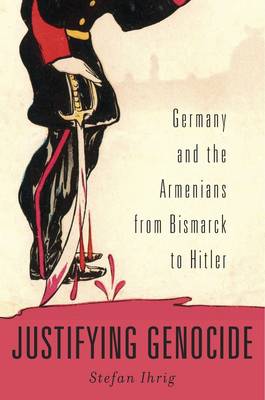
Stock image for illustration purposes only - book cover, edition or condition may vary.
Justifying Genocide
Stefan Ihrig
€ 58.27
FREE Delivery in Ireland
Description for Justifying Genocide
Hardcover. As Stefan Ihrig shows in this first comprehensive study, many Germans sympathized with the Ottomans longstanding repression of the Armenians and with the Turks program of extermination during World War I. In the Nazis version of history, the Armenian Genocide was justifiable because it had made possible the astonishing rise of the New Turkey." Num Pages: 446 pages. BIC Classification: 1DFG; 1DVUR; 3JH; 3JJ; HBJD; HBLL; HBLW; HBTZ. Category: (G) General (US: Trade). .
As Stefan Ihrig shows in this first comprehensive study, many Germans sympathized with the Ottomans' longstanding repression of the Armenians and with the Turks' program of extermination during World War I. In the Nazis' version of history, the Armenian Genocide was justifiable because it had made possible the astonishing rise of the New Turkey.
As Stefan Ihrig shows in this first comprehensive study, many Germans sympathized with the Ottomans' longstanding repression of the Armenians and with the Turks' program of extermination during World War I. In the Nazis' version of history, the Armenian Genocide was justifiable because it had made possible the astonishing rise of the New Turkey.
Product Details
Publisher
Harvard University Press United States
Number of pages
446
Format
Hardback
Publication date
2016
Condition
New
Weight
910g
Number of Pages
446
Place of Publication
Cambridge, Mass, United States
ISBN
9780674504790
SKU
V9780674504790
Shipping Time
Usually ships in 7 to 11 working days
Ref
99-1
About Stefan Ihrig
Stefan Ihrig is Professor of History at the University of Haifa.
Reviews for Justifying Genocide
Yet another excellent book by Stefan Ihrig about the uncanny German-Turkish connection. The story of the Armenian Genocide and its reception in post-World War I Germany thus becomes a German, not a Turkish or Armenian, story about racism and the road taken by Germany toward the Holocaust. A surprising answer to the question: How was the Holocaust possible in twentieth-century Germany of all places?
Moshe Zimmermann, The Hebrew University of Jerusalem This book is a major contribution to the study of German attitudes toward the Armenian Genocide. It puts German policies and reactions to Ottoman Turkey in the general perspective of Germany's policies before, during, and after World War I. It deals with the parallels between German attitudes to Armenians and to Jews, and permits us to understand the complexities and problems of different minority groups within German society relative to Turkey.
Yehuda Bauer, Yad Vashem Fascinating and highly readable... Ihrig brilliantly lays bare the 'confluence' between German anti-Semitic and anti-Armenian stereotypes.
Lawrence Douglas Irish Times (02/20/2016) It is striking to see the ideological similarities between Germany in the late 1920s and Kemalist Turkey, or Mussolinian Italy. Written in a lively style, well-balanced and well-documented, this book will advance the debate on the relationship between mass violences that marked the twentieth century.
Raymond K vorkian, University of Paris VIII In this compelling narrative, Ihrig finds that the so-called Armenian Horrors were vigorously debated in the [German] government and in periodicals of the time... Ihrig's deep, scrupulous research reveals the official pattern set by the Germans 'vis- -vis the Armenians' as an 'enabler' for the Ottomans, later giving way to open justification, denial, and whitewashing of the horrors visited on the Armenian people... A groundbreaking academic study that shows how Germany derived from the Armenian genocide 'a plethora of recipes' to address its own ethnic problems.
Kirkus Reviews (11/01/2015) After Atat rk in the Nazi Imagination, Stefan Ihrig again presents an intelligent book of uncommon originality. By exposing how 'justificationalism' led to an ethic-free thinking in concepts of 'final solutions, ' he shows how this became a strong mental link between the Armenian Genocide and the Shoah. Written in the elegant style of a historical drama in several acts, this is a great achievement.
Rolf Hosfeld, Lepsiushaus Potsdam
Moshe Zimmermann, The Hebrew University of Jerusalem This book is a major contribution to the study of German attitudes toward the Armenian Genocide. It puts German policies and reactions to Ottoman Turkey in the general perspective of Germany's policies before, during, and after World War I. It deals with the parallels between German attitudes to Armenians and to Jews, and permits us to understand the complexities and problems of different minority groups within German society relative to Turkey.
Yehuda Bauer, Yad Vashem Fascinating and highly readable... Ihrig brilliantly lays bare the 'confluence' between German anti-Semitic and anti-Armenian stereotypes.
Lawrence Douglas Irish Times (02/20/2016) It is striking to see the ideological similarities between Germany in the late 1920s and Kemalist Turkey, or Mussolinian Italy. Written in a lively style, well-balanced and well-documented, this book will advance the debate on the relationship between mass violences that marked the twentieth century.
Raymond K vorkian, University of Paris VIII In this compelling narrative, Ihrig finds that the so-called Armenian Horrors were vigorously debated in the [German] government and in periodicals of the time... Ihrig's deep, scrupulous research reveals the official pattern set by the Germans 'vis- -vis the Armenians' as an 'enabler' for the Ottomans, later giving way to open justification, denial, and whitewashing of the horrors visited on the Armenian people... A groundbreaking academic study that shows how Germany derived from the Armenian genocide 'a plethora of recipes' to address its own ethnic problems.
Kirkus Reviews (11/01/2015) After Atat rk in the Nazi Imagination, Stefan Ihrig again presents an intelligent book of uncommon originality. By exposing how 'justificationalism' led to an ethic-free thinking in concepts of 'final solutions, ' he shows how this became a strong mental link between the Armenian Genocide and the Shoah. Written in the elegant style of a historical drama in several acts, this is a great achievement.
Rolf Hosfeld, Lepsiushaus Potsdam
